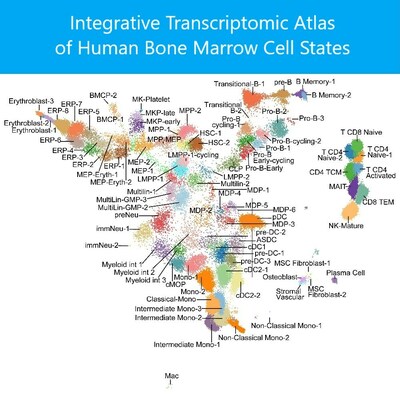Subjects: SVY, TRI
Advanced Map of Human Blood Stem Cells Could Guide Highly Targeted Leukemia Care
Scientists at Cincinnati Children's lead deepest dive yet into the mechanics of blood cell development. They found new treasure.
CINCINNATI , March 21, 2024 /PRNewswire/ -- Thanks to an unusual application of game theory and machine learning technology, a large team of scientists led by experts at Cincinnati Children's has published the world's most detailed "atlas" of the many types of stem cells and early progenitors involved in producing human blood from diverse donors.
The team has identified more than 80 distinct subsets of hematopoietic stem and progenitor cells (HSPCs) ? early-stage cells that kick off production of mature red cells, white cells and other elements of our complex blood system. Details were published March 21, 2024, in Nature Immunology.
"We believe our highly focused capture strategy of the earliest HSPCs, intermediate cell states plus stromal populations, and the most abundant end states provides the deepest view of bone marrow stem and progenitor compartments described to date," the co-authors state.
The study was led by co-first authors Xuan Zhang, PhD, and Baobao Song, PhD, and co-corresponding authors Nathan Salomonis, PhD, and H. Leighton Grimes, PhD, all researchers with Cincinnati Children's. Overall, the study includes 26 co-authors from four academic medical centers and two biotech companies.
Leukemia implications and more
This complex research project involved using multiple advanced genomic research tools and computational methods to build detailed genomic and proteomic profiles of more than 300,000 bone marrow cells collected from a diverse mix of donors spanning race and sex. Cincinnati Children's is committed to promoting inclusivity and addressing population diversity in scientific studies as part of their ongoing mission.
In addition to meticulous single-cell RNA sequencing work and matching flow cytometry, analyzing the massive data set required innovative use of machine learning technology and dipping into game theory to perform key statistical analyses. Some of the research tools the team used, including two software tools scTriangulate and pyIninityFlow, were developed at Cincinnati Children's.
Among the team's key findings:
- Mixing a new "cocktail" of 132 antibodies that can target surface proteins on HSPCs and related cells. Testing demonstrated that the new mix outperforms commercial products for profiling human bone marrow cells.
- Identifying 89 clusters by a novel integration of gene expression and surface proteins helped reveal new stem/progenitor cell populations.
- Strategies and markers for isolating novel cell populations. First, two novel surface markers C5L2 and TSPAN33 to identify cells entering transitional states between progenitor status and becoming a mature neutrophil. Second, distinct staging of human red blood cell formation called erythroblasts with CD326 and CD235a.
- New online computational tools to predict the cellular origins and possible causes of cancers such as acute myeloid leukemia (AML).
"Our analysis uncovers previously hidden cell states, such as the most primitive stem cells, by combining information from diverse prior atlases, surface markers and genes, and new advances in machine learning," Salomonis says.
One of the most immediate potential applications of the new stem cell atlas centers on how treatment centers monitor patients receiving therapies for leukemia.
"For example, some people develop resistance to Venotoclax with azacytidine (a chemotherapy that was approved in 2018 as a first line therapy for AML)," Grimes says. "In some cases, the therapy-resistant disease appears to be driven by a "monocytic" form of leukemia stem cell (m-LSC) rather than a more "primitive" form (p-LSC). With an atlas like this, it becomes more possible to determine which types of cancer stem cells are present in the AML, and that information could then inform how a clinician might adjust a treatment regimen."
The new study reports finding 69 antibodies within 23 cell states that may represent attractive biomarkers for clinical monitoring of people with AML.
While the development of the new stem cell atlas is an essential start, much more research and development will be needed to integrate the new data about blood cell formation into medical care, Grimes says.
Making the tool available
The co-authors predict that the new digital bone marrow atlas will accelerate the discovery of more cellular and molecular regulators of blood diseases. To support such efforts, the research team is making its data and tools widely available to the research community.
While the Nature Immunology article has been made open access, full detail and access to this advanced digital resource, including data viewers, methods, raw data and code, are available at https://altanalyze.org/MarrowAtlas/.
About the study
In addition to the first and corresponding authors, contributing co-authors from Cincinnati Children's include Guangyuan Li, Dan Schnell, Kairavee Thakkar, Michal Kouril, Kang Jin, Stuart Hay, and Sidharth Sen, all with the Division of Biomedical Informatics; plus Kyle Ferchen, Bailee Kain, David Bernardicius, Siyuan Ma, and Sierra Bennett, all with the Division of Immunobiology.
Data acquisition for this study included support from the Research Flow Cytometry Core and the DNA Sequencing and Genotyping Core at Cincinnati Children's.
Contributors also included scientists from the Yale School of Medicine, University of Pittsburgh, University of Colorado School of Medicine, San Diego-based BioLegend Inc., and Massachusetts based Curiox Biosystems, Inc.
Funding sources for this work include several grants from the National Institutes of Health, especially an RC2 grant from the NIDDK, complemented by an NIDDK Cooperative Centers of Excellence in Hematology grant, a Specialized Center of Research (SCOR) grant from the Leukemia & Lymphoma Society, and the US Department of Veterans Affairs.
SOURCE Cincinnati Children's Hospital Medical Center
These press releases may also interest you
|
News published on and distributed by:




